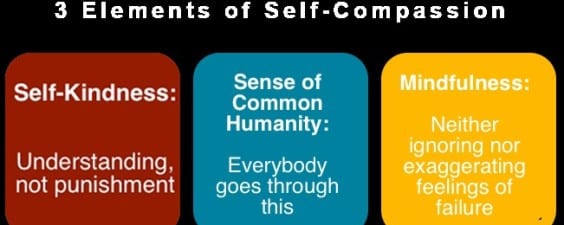15 Mar THE ART OF SELF COMPASSION: Can Self-compassion Help Me?

Can Self-compassion help me?
We know how to be kind to others and how it makes them feel. You too can learn to be kind to yourself….
Dr Kirsten Neff introduced the concept of self compassion as an alternative from of self relating or acceptance, further highlighting the potential benefits of self compassion in relation to the more widely recognized concept of self esteem. Neff proposed the construct of self compassion as a healthy form of self acceptance that involves having a compassionate attitude towards oneself in the face of hardship or perceived inadequacy. Neff defined the three components of self-compassion as; self kindness, common humanity, and mindfulness (Neff, 2003).
The first component of having a self compassionate stance stance, requires that one to be kind and understanding towards oneself when failure, inadequacy, or misfortune is experienced (Neff, 2003). The ability to view the self with kindness even in the face of failure or hardship is argued to provide the safety needed to see the self clearly without fear of self condemnation and, therefore, avoiding the need to repress feelings, as well as providing a supportive outlook for growth and change (Neff, 2003). Neff argues that truly having compassion for oneself entails desiring health and well being for one-self, which involves gently encouraging change where needed and rectifying harmful or unproductive patterns of behaviour (Neff, 2003).
The second component of self compassion, defined as ‘Common Humanity’ allows for recognition of the related experiences of the self and others, in which pain and imperfection are acknowledged as an inevitable part of the human experience, as opposed to isolated occurrences that only happen to one alone (Neff, 2003). By focusing on the interconnected aspects of experience, an individual high in self compassion acknowledges that all human beings fail and experience pain, and thus is argued to be distinctive from self pity in which individuals feel highly disconnected from others (Neff, 2003).
The third component of self-compassion, defined as ‘Mindfulness’ refers to taking a balanced approach so that feelings are neither suppressed nor exaggerated (Neff, 2003). An individual high in self compassion is able to experience feelings without suppressing or becoming completely overwhelmed by them, thus avoiding the disabling process of over-identifying with their emotions (Neff, 2003).
An understanding of the inter-connectedness and mindful awareness needs to be developed alongside increased self kindness, to enable one’s experiences to be seen clearly without the loss of perspective that stems from excessive self criticism, feelings of isolation, and over-identification with one’s experiences (Neff, 2003).
Neff, K.D. (2003). Self-Compassion: An alternative conceptualization of a healthy attitude toward oneself. Journal of Self and Identity, 2, 85-101.
As a practitioner I have seen the proposed benefits of self-compassion, in supporting healthy self-attitudes, and facilitating resilience and adaptation.
Dr Kerry Chillemi – Clinical Psychologist


Sorry, the comment form is closed at this time.